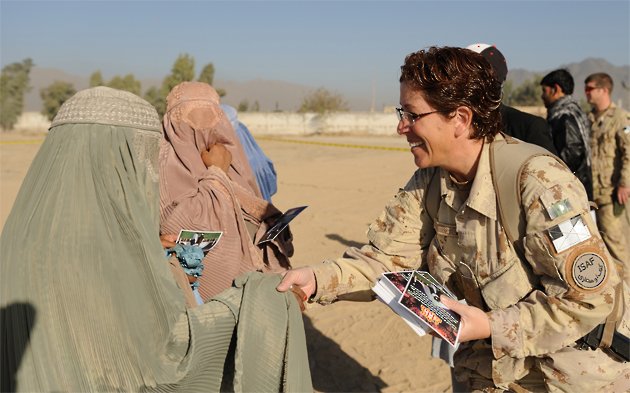Women Breaking Afghani Language Barriers
SDSUs Language Acquisition Resource Center helps female soldiers connect with a critical part of Afghan society.

The first time Marine Sergeant Patricia Aquino deployed to Afghanistan as part of a special cultural relations envoy, she relied on simple phrases and hand signals to engage with local women.
Without an official translator there, Aquino immediately felt the limitation of her communication skills.
"Female linguists are in very short supply," she said. "Sometimes we have female linguists who speak the language, but they cannot handle the physical aspects and austerity of their environment."
Engaging Afghan women
The envoy — called the Female Engagement Team — aims to interact with the Afghan female population. Because of cultural traditions and boundaries, male service members are not allowed to interact with local women.
The seven-month assignment sparked Aquino's desire to learn Pashto and further develop understanding of Afghan culture, and she enrolled in SDSU’s Language Acquisition Resource Center.
“The ability to speak the locals’ language was the most important facet of our communication. That was the driving force behind my motivation to learn Pashto.”
Language acquisition at SDSU
SDSU is home to one of 15 U.S. Department of Education-sponsored language resource centers whose programs focus on:
- Teacher training
- Materials development
- Community outreach
- Language testing
- Technology
Pashto is one of several critical languages taught at the Language Acquisition Resource Center. Designed for soldiers in combat-affected regions that require cultural sensitivity, the courses help them become more effective interacting with locals. That interaction goes a long way in what can be a very sensitive situation.
The SDSU Language Acquisition Resource Center demonstrates the global impact of SDSU, a key initiative of the Campaign for SDSU. Whether it’s the university’s Fulbright scholars, its study abroad opportunities or the international research of its faculty members, SDSU competes on an international level. Learn more about SDSU's global impact and how you can help.
“Afghans are a very close-knit, tight community; they’re not very trusting of outsiders,” Aquino said. “When a person from the community sees that a foreigner has taken the time to learn their language, trust is automatically established. It conveys the message that we care.”
Culturally sensitive
Because of cultural barriers, the need for female linguists in Afghanistan is crucial. Courses offered at the Language Acquisition Resource Center in Arabic, Persian and Pashto give military personnel the opportunity to become proficient in various critical languages and cultures.
“We wanted to know more about the locals’ needs in the areas of education, healthcare and security,” Aquino said.
During the first week of the eight-week elementary Afghan (Pashto) course, Aquino had already learned the alphabet. After three weeks, she could read and write.
“Every week, more is expected of you,” she said. “But it’s great because it gets you to the level where you need to be.”





